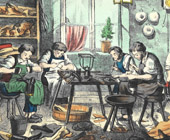 I had just bought a pair of shoes at a large shoe outlet and within six months the heels were completely worn down. I lost the receipt and probably would have had a little trouble getting a new pair. So I decided to visit the local cobbler with the shoes and a piece of leather carry-on luggage with a broken latch. I only expected him to fix my things but I also came out with a lesson in economy.
I had just bought a pair of shoes at a large shoe outlet and within six months the heels were completely worn down. I lost the receipt and probably would have had a little trouble getting a new pair. So I decided to visit the local cobbler with the shoes and a piece of leather carry-on luggage with a broken latch. I only expected him to fix my things but I also came out with a lesson in economy.
The cobbler shop is just off the main street in a small Pennsylvania town nearby. It is an unassuming building where you can walk in from the sidewalk and the bells on the doors announce your arrival. The cobbler lives in semi-retirement upstairs. He is open on afternoons to any who need his services and to all his friends who just want to come around and talk.
Upon entering, the first thing you see is a counter with an old-fashioned cash register and all sorts of leather products with an order known only to the cobbler himself. There is something warm and familiar about the whole scene, which is permeated by the smell of leather. On one side there are some shelves where you can buy a strange array of unclaimed items. Visible in the back is the workshop and stitching machines where the actual cobbling is done.
 The cobbler is an older gentleman with a round face who greets me with ease. We exchange some small talk and then enter into the business at hand. I present my shoes and he looks at them and delivers his diagnosis.
The cobbler is an older gentleman with a round face who greets me with ease. We exchange some small talk and then enter into the business at hand. I present my shoes and he looks at them and delivers his diagnosis.
“Worn heels, I guess I could put a pair on for you,” he says. He takes out a small square of paper and writes my phone number on it, makes a hole in the paper and threads one of the shoe laces through it. He gives me no receipt to show that he has my shoes. I must trust him, and I do.
He looks at my carry-on with the broken latch. That proves a bit more difficult. He opens up a little cabinet and pulls out some latches. None of them will work. And so he ponders the situation for a while looking at it this way and that.
“Snaps,” he says pensively. “I could put on some snaps.” He shows me how he would attach them to the bag to make it easy to open. We discuss the matter and come to an agreement. I must return some time next week.
Leaving the cobbler shop, I thought a bit about what had just happened not from the point of view of foot ware but from the perspective of the economic studies I have long pursued.
Here was an example of economy without that frenetic intemperance that you find in so many parts of modern markets. There was nothing of that frenzied sense of immediacy where you must have everything right away, regardless of the consequence. I did not sense that machine-like treatment that makes so much of modern economy cold and impersonal, fast and frantic.
Instead, my visit had that human element that made the experience warm and personal. I was a valued customer not a number. He became my cobbler. I appreciated the trust that was the basis of our transaction, and which is so essential for any free market. Above all, there was a notion of honor. You could feel the sense of craftsmanship, quality and pride in his work. He would stand behind his work as he has for decades. He does not need to advertise since he lives off his good reputation.
Some might object that the cobbler is a figure from the past that has no role in modern economy. Today’s markets with their cheap goods have eliminated the need for such professions. When something breaks, just buy another one. There is no demand for cobblers anymore.
And yet I would disagree. At least in my area, people are looking for them. The old cobblers are dying off in the region and the unemployed new generations (anxious perhaps for more exciting careers) no longer want to commit to such a profession. I was told that my cobbler laments the fact that he can find no one to take his place in the face of obvious demand.
I am not suggesting that everyone should run their business like my cobbler. However, I am suggesting that we should return to an order where trust, honor and temperance can once again prevail.
In this sense, I cannot help but think of the economic good my cobbler has done by plying his trade. Without the cobbler, I would have been forced to buy another cheap seventy-dollar pair of shoes made in India and an expensive carry-on leather portfolio from who knows where. Instead, I spent some twenty dollars for the repairs…and the human experience. The whole affair had a calming effect upon me and the economy since it tempers that frenetic desire of buying without restraint or reflection that sooner or later leads to frenzied and failed markets.
That is what I learned from a visit to my cobbler and my accidental lesson in economy. If  there were more cobblers and fewer derivative traders, I believe the world would be a calmer and richer place.
there were more cobblers and fewer derivative traders, I believe the world would be a calmer and richer place.


